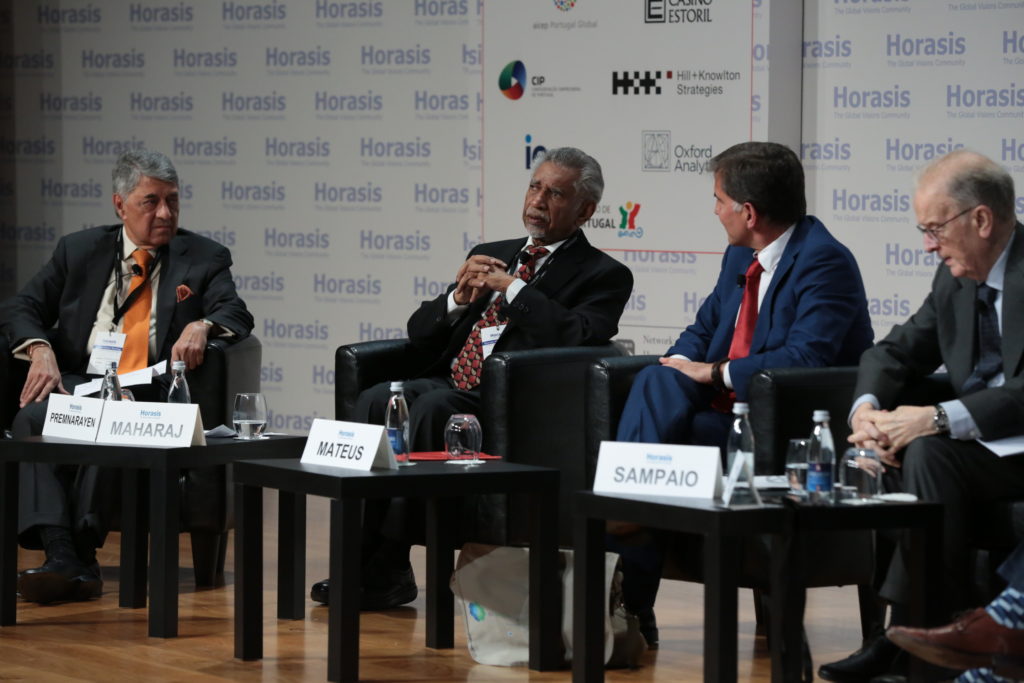The centenary of the birth of Nelson Mandela, who worked tirelessly to free South Africa from racial division, was celebrated on May 5 at the Horasis Global Meeting in Cascais, Portugal.
The panel at the Horasis Global Meeting, which included Sello Hatang, Chief Executive of the Nelson Mandela Foundation; Mac Maharaj, the Former Minister of Transport in the Government of President Nelson Mandela; Deepak Premnarayen, the Chairman, ICS Group; Jorge Sampaio, the Former President of Portugal; and António Mateus, Presenter, Portuguese Public TV (RTP) and the author of two best-selling books on Nelson Mandela, sought to address the question of how we can translate Mandela’s legacy into our time.

Panel on Nelson Mandela and his legacy at Horasis Global Meeting, May 5, 2018
Recounted ICS Group Chairman Deepak Premnarayen and friend to Nelson Mandela, there have been numerous times where people spoke about business in the context of Nelson Mandela.
These lessons include the importance of developing a capacity for self control, the need to be a great listener, and his belief in lasting agreement. Said Mr. Premnarayen in discussing Mr. Mandela’s legacy, “People who conquer the world wait for the right time, unfettered.”
Notably, the panel also honored the families and loved ones of South Africa’s freedom fighters who served the cause, often without recognition, through their own personal sacrifices.
Speaking about Mandela, Mr. Maharaj – who also spent years imprisoned on Robben Island – said:
“I remember how, in that cold and soul-deening loneliness of the prison cell, he wrapped his pain in a blanket, sat motionless and expressionless, when he learnt on different occasions on the death of his mother, of the passing on his son Thembi, and of the torture that comrade Winnie was subjected to in detention without trial.
“I remember those moments because, while many knew of the brutalities – both physical and psychological that we detainees and prisoners experienced and admire us for surviving – few know that the greater pain we underwent was the agony, suffering and torture of our families outside – our spouses and children. I remember because, no matter the torture I bore in detention in 1964, it was the assault in detention of my wife […] that I could not endure. It was a different kind of pain compounded by a searing sense of helplessness. It turned forever the iron in my soul into steel. I remember a rare moment when Madiba almost assaulted a warder for denigrating his wife, Winnie.
“I remember those moments of pain and helplessness that were visited upon Madiba and understood how they planted within us an everlasting sense of guilt that we failed our families when they needed us most; that the honor of serving the cause of freedom belongs to them.
“When shall we bring their deeds out of the shadows, to shine the light on them?” Mr. Maharaj beseeched the audience.
At the closure of the panel the memories of Mr. Mandela and the implications of his legacy on the business community were reflected upon. Mr. Maharaj used an example of rugby and the Springboks team, which were still considered symbols of the white ruling class, as an example of bringing different parties together. “Mandela walked onto that field as the President of the country wearing the Springbok’s Francois Pienaar’s number 6 jersey, wishing both teams success. The audience was 90% white and spontaneously began to shout, “Nelson! Nelson!”
Mandela brought together people who disagreed with him, said Mr. Premnarayen.
Two years later racism was under scrutiny in front of the South African courts. Louis Luyt went to court to argue that the Rugby Union was private and could exclude black players. Mandela wrote an affidavit that was ridiculed by the judges as ‘false’. “The first thing he did in court was to shake hands with Louis Luyt,” Mr. Maharaj said, noting the political risk involved in Mandela’s actions.
“He was doing this to make sure that the people of South Africa were going to respect the institutions of justice.”
Some 50 Portuguese leaders in politics, business, academia, and the media join 600 global influencers at the Horasis Global Meeting in Cascais from May 5-8.

Horasis Founder and Chairman Dr. Frank-Jürgen Richter recently told The Sociable why he chose Cascais as the location for the annual flagship event.
“Cascais has the beaches, the sunshine and its wonderful people,” said Dr. Richter.
“Cascais is open to the world as it is located on the seashore and for centuries Portugal has explored the oceans across the globe. We try to capture this open spirit in our discussions – we want to embrace globalization and sustainable development,” the Horasis chairman added.

